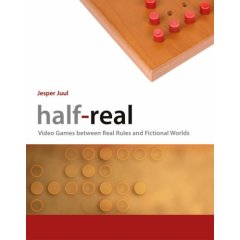half-realVideo Games between Real Rules and Fictional Worlds
|

|
 Zusammenfassungen
Zusammenfassungen
 A video game is half-real: we play by real rules while imagining a fictional world. We win or lose the game in the real world, but we slay a dragon (for example) only in the world of the game. In this thought-provoking study, Jesper Juul examines the constantly evolving tension between rules and fiction in video games. Discussing games from Pong to The Legend of Zelda, from chess to Grand Theft Auto, he shows how video games are both a departure from and a development of traditional non-electronic games. The book combines perspectives from such fields as literary and film theory, computer science, psychology, economic game theory, and game studies, to outline a theory of what video games are, how they work with the player, how they have developed historically, and why they are fun to play.
A video game is half-real: we play by real rules while imagining a fictional world. We win or lose the game in the real world, but we slay a dragon (for example) only in the world of the game. In this thought-provoking study, Jesper Juul examines the constantly evolving tension between rules and fiction in video games. Discussing games from Pong to The Legend of Zelda, from chess to Grand Theft Auto, he shows how video games are both a departure from and a development of traditional non-electronic games. The book combines perspectives from such fields as literary and film theory, computer science, psychology, economic game theory, and game studies, to outline a theory of what video games are, how they work with the player, how they have developed historically, and why they are fun to play.
Locating video games in a history of games that goes back to Ancient Egypt, Juul argues that there is a basic affinity between games and computers. Just as the printing press and the cinema have promoted and enabled new kinds of storytelling, computers work as enablers of games, letting us play old games in new ways and allowing for new kinds of games that would not have been possible before computers. Juul presents a classic game model, which describes the traditional construction of games and points to possible future developments. He examines how rules provide challenges, learning, and enjoyment for players, and how a game cues the player into imagining its fictional world. Juul's lively style and eclectic deployment of sources will make Half-Real of interest to media, literature, and game scholars as well as to game professionals and gamers.
 Dieses Buch erwähnt ...
Dieses Buch erwähnt ...
 Begriffe KB IB clear |  Computer Computer computer
, computer
,  Computerspiele Computerspiele computer game
, computer game
,  Spiel Spiel game
, game
,  Virtual Reality Virtual Reality virtual reality virtual reality
|
 Dieses Buch erwähnt vermutlich nicht ...
Dieses Buch erwähnt vermutlich nicht ... 
 Nicht erwähnte Begriffe | Virtualität |
 Zitationsgraph
Zitationsgraph
 Zitationsgraph (Beta-Test mit vis.js)
Zitationsgraph (Beta-Test mit vis.js)
 8 Erwähnungen
8 Erwähnungen 
- Handbuch Medienpädagogik (Uwe Sander, Friederike von Gross, Kai-Uwe Hugger) (2008)
- Computerspiele und Videogames in formellen und informellen Bildungskontexten (2008)
- A New Culture of Learning - Cultivating the Imagination for a World of Constant Change (Douglas Thomas, J. S. Brown) (2011)


- Perspektiven der Medienbildung (Winfried Marotzki, Norbert Meder) (2014)


- 11. Bildungspotenziale von Computerspielen - Überlegungen zur Analyse und bildungstheoretischen Einschätzung eines hybriden Medienphänomens (Johannes Fromme, Christopher Könitz)


- 11. Bildungspotenziale von Computerspielen - Überlegungen zur Analyse und bildungstheoretischen Einschätzung eines hybriden Medienphänomens (Johannes Fromme, Christopher Könitz)
- The War on Learning (Elizabeth Losh) (2014)

- Die granulare Gesellschaft - Wie das Digitale unsere Wirklichkeit auflöst (Christoph Kucklick) (2014)

- Computerunterstützte Gamifizierung in der Sekundarstufe I - Konzeption und Erforschung von Maßnahmen zur Einbindung spielerischer Elemente in Lernsettings (Nando Stöcklin) (2018)


- Big Data, Datafizierung und digitale Artefakte (Stefan Iske, Johannes Fromme, Dan Verständig, Katrin Wilde) (2020)


- Relationen und Referenzen - Zum digitalen Realismus von Computerspielbildern (Tim Raupach)


- Relationen und Referenzen - Zum digitalen Realismus von Computerspielbildern (Tim Raupach)
 Co-zitierte Bücher
Co-zitierte Bücher

Confronting the Challenges of Participatory Culture
Media Education for the 21st Century
(Henry Jenkins, Katie Clinton, Ravi Purushotma, Alice J. Robison, Margaret Weigel) (2006)



Hanging Out, Messing Around, and Geeking Out
kids living and learning with new media
(Mizuko Ito, Sonja Baumer, Matteo Bittanti, danah boyd, Rachel Cody, Becky Herr-Stephenson, Heather Horst, Patricia G. Lange, Dilan Mahendran, Katynka Z. Martínez, C.J. Pascoe, Dan Perkel, Laura Robinson, Christo Sims, Lisa Tripp) (2010)



Computer Games and New Media Cultures
A Handbook of Digital Games Studies
(Johannes Fromme, Alexander Unger) (2012)
 Bibliographisches
Bibliographisches 
 Beat und dieses Buch
Beat und dieses Buch
Beat war Co-Leiter des ICT-Kompetenzzentrums TOP während er dieses Buch ins Biblionetz aufgenommen hat. Die bisher letzte Bearbeitung erfolgte während seiner Zeit am Institut für Medien und Schule. Beat besitzt weder ein physisches noch ein digitales Exemplar. Aufgrund der wenigen Einträge im Biblionetz scheint er es nicht wirklich gelesen zu haben. Es gibt bisher auch nur wenige Objekte im Biblionetz, die dieses Werk zitieren.




















 Biblionetz-History
Biblionetz-History